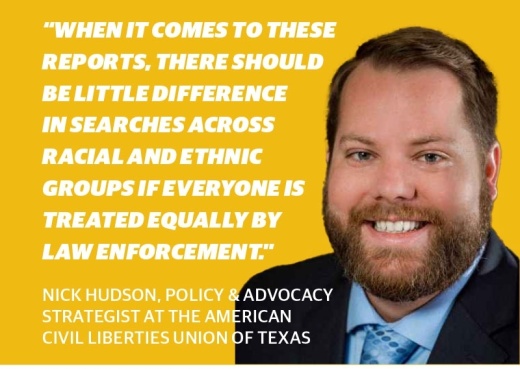The annual racial profiling reports comply with Senate Bill 1849, known as the Sandra Bland Act, which was signed into law in 2017. The act, named after a woman who died by suicide in a jail cell after she was arrested during a traffic stop in 2015, requires agencies to compile traffic stop data and submit it annually in a report to the Texas Commission on Law Enforcement.
In addition, agencies are required to analyze the traffic stop data for indicators of racist policing and address it internally, according to the TCOLE. The report requires officers to compile data on every traffic stop conducted, including the race of the driver, the reason for the stop and the result of the stop, among other points.

In an email to Community Impact Newspaper, Montgomery County Sheriff’s Office Lt. Scott Spencer said the sheriff’s office reviewed and analyzed the findings of its 2021 racial profiling report from Jan. 1-Dec. 31, 2021, and found no bias by deputies.
However, Nick Hudson, policy and advocacy strategist at the American Civil Liberties Union of Texas, said racial profiling reports across Texas show Black drivers statewide are disproportionately pulled over, searched and arrested.
“There is a long history of rationalization and denial of racial disparities in policing,” Hudson said. “What is so important about these reports is that hard data moves us beyond accusations and denials.”
Report findings
The MCSO made 49,358 traffic stops in 2021 with deputies reporting the race of the driver was unknown prior to the stop roughly 97% of the time.
However, in the demographic breakdown of the traffic stop data, 11.7% of stops were conducted on Black drivers despite Black people making up 5.5% of the county population, according to the U.S. Census Bureau 2020 decennial census data. Comparatively, 59.9% of the stops involved white drivers, who make up 59.9% of the county population. Kevin Lawrence, the executive director of the Texas Municipal Police Association, said several factors create disparities in the report data other than racial profiling.

“If we assume there should be equity, then we look at the data because the data doesn’t match up, then we jump to the conclusion: It must be because of racism,” Lawrence said. “The fact of the matter is there are a billion reasons that can affect that data; racism on the part of the law enforcement officers is simply one of them. Why are we assuming that has to be the primary cause when we now have 20 years’ worth of data that tells us that’s not the case?”
The MCSO report shows Black drivers were arrested at higher rates; however, 43.4% of arrests of Black drivers were due to an outstanding warrant, compared to 24.4% of white drivers arrested for outstanding warrants.
According to the 2021 MCSO report on traffic stops resulting in an officer issuing a citation or a verbal or written warning, Black drivers received more citations than warnings when compared to white drivers despite being pulled over proportionally for similar reasons. On stops of Black drivers that resulted in a citation or warning, 14.7% of the stops resulted in a citation while 85.3% resulted in a warning. Comparatively, 11.6% of the stops on white drivers resulted in a citation, while 88.4% resulted in a warning.
Black drivers were also more likely to be searched with a search conducted on 6.3% of stops on Black drivers, according to 2021 MCSO data. As a result of the searches, contraband was found at a higher rate for Black drivers who were searched compared to white drivers who were searched, according to the data.

“There should be little difference in searches across racial and ethnic groups if everyone is treated equally by law enforcement,” Hudson said. “This data demonstrates that people of color are just treated differently by law enforcement in Texas.”
According to reports from Shenandoah and Oak Ridge North police departments, the departments received no racial profiling complaints in 2021. MCSO received one complaint alleging racial profiling, and the complaint was deemed “unfounded,” according to the report.
According to Montgomery County documents, an individual who wishes to file a racial profiling or discrimination complaint against a MCSO deputy may do so by contacting any on-duty supervisor or the MCSO Internal Affairs Unit. After an internal investigation, corrective action for any deputy shown to have engaged in racial profiling is disciplined in accordance with policy outlined in the General Manual of Operations, according to county materials.
Hudson said he believes external investigations should be a part of the process.“When there is not independence in that evaluation and their disciplinary procedures, officers can escape accountability for misconduct,” Hudson said.
Traffic stop data unreliability
Members of law enforcement agencies and civil rights organizations agreed elements of the traffic stop data may be unreliable.
During analysis, traffic stop data is compared to a variety of U.S. Census Bureau demographic data for the agency’s city or county. However, the data does not reflect nonresident drivers stopped by law enforcement. Lawrence said he does not believe analyzing the reports are an effective way to determine if an officer or agency is engaging in racial profiling. Instead, Lawrence said local leadership must monitor departments and enforce policies to stop potential racial profiling practices.
Spencer attributed the disparities in MCSO traffic stops to the demographics of nearby counties and of nonresident travelers.
“In addition to sharing a geographical boundary with Harris County, Montgomery County has two major roadway systems—I-45 and [Hwy.] 59—that share a common route with Harris County,” Spencer said in an email. “Logically, Montgomery County’s traffic data is heavily influenced by Harris County’s population demographics.”
A total of 885,517—or 18.7%—of the Harris County population is Black, and roughly 39,246 residents of Harris County commute to work in Montgomery County, according to 2020 decennial data from the U.S. Census Bureau. The Shenandoah Police Department faces a similar issue when analyzing traffic stop data. According to U.S. Census Bureau data, the 2-square-mile city has a population of roughly 3,500, and the SPD report states 4,657 traffic stops were conducted in 2021.

SPD Lt. Jake Reuvers said the concentration of entertainment and shopping centers, restaurants and 13 hotels in addition to the city’s proximity to Houston has a direct effect on the demographics of the drivers patrol comes in contact with.“It’s extremely rare for us to contact our residents from a criminal or traffic enforcement standpoint in these areas,” Reuvers said in an email.
Another obstacle to agencies being able to accurately analyze traffic stop data is data collected on Hispanic and Latino populations may not be reliable, according to Hudson.
Referred to as the “Latino data problem,” officers may not be able to decipher if an individual is Hispanic or Latino because Hispanic and Latino are ethnicities—not a racial group. Populations may be classified as white in the reports, which could result in inaccurate data, he said.
“The problem is—under most circumstances—[officers] are discouraged from either asking someone about their race or ethnicity, and [we are] discouraged about making assumptions about somebody’s race or ethnicity,” Lawrence said. “How is an officer supposed to know?”
Systemic solutions
The Texas Office of the Governor’s Criminal Justice Division requires each county in Texas to have a public safety community plan to identify gaps in services regarding criminal justice issues. The Montgomery County Criminal Justice Community Plan identifies the need to establish trust and improve communication between law enforcement and community members, stating national trends show increased public mistrust in law enforcement.
According to the plan, the county aims to address the issue by producing policies and programs to improve communication between law enforcement and the community. According to the plan, the MCSO conducts numerous community policing and outreach events, such as National Night Out gatherings.Additional MCSO initiatives include a racial profiling training for officers—which are outlined by the TCOLE—and body and vehicle cameras. Spencer said there are procedures in place that prohibit racial bias in traffic enforcement, such as supervisory personnel who proactively and routinely review in-car and body camera footage to ensure compliance with these policies.
“All we can hope to end is the impact of racism in our law enforcement agencies,” Lawrence said. “We then need to look at what are the other dynamics that are causing this statistical anomaly and causing people of color to feel like law enforcement is targeting them unfairly? And let’s address that.”
Jishnu Nair contributed to this report.





